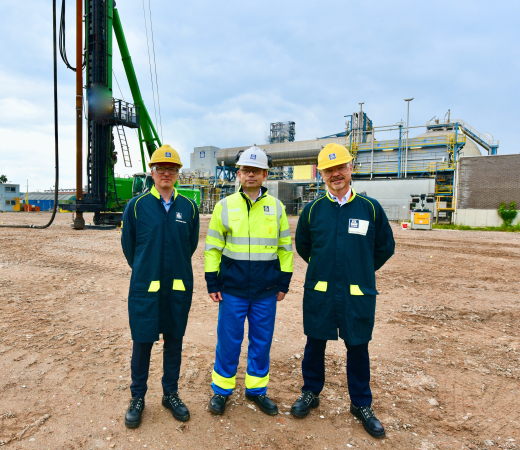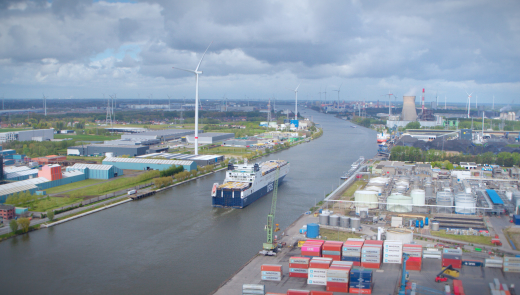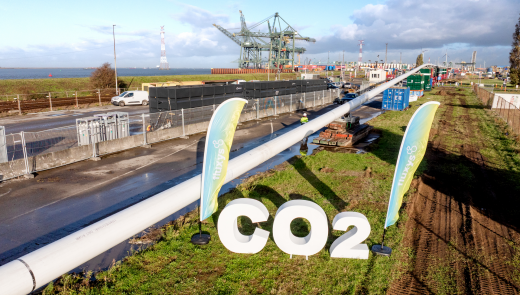First pile of CCS project Yara Sluiskil driven

Photo: Igor Lavretsov (Project Manager Linde Engineering Dresden), Michael Schlaug (Vice President Yara Netherlands) and Jostein Tegle (Strategy & Market Director Northern Lights) drove the first pile for the Carbon Capture & Storage project on May 22, 2024 at 12.00.
With this Carbon Capture & Storage (CCS) project, Yara Sluiskil will prevent no less than 12 million tons of CO2 emissions from 2026. The factory that Linde is building to liquefy the captured CO2 is the largest in the world and requires an investment of 194 million euros. The liquid CO2 is brought to Norway from Sluiskil by two ships per week by Northern Lights to be permanently stored in the seabed. Yara Sluiskil is the first company to invest on a large scale in CO2 reduction within Maatwerk. The CCS project is a cornerstone for the development of blue hydrogen and also the first project in which CO2 is transported cross-border on a large scale. Yara Sluiskil remains a global leader and sets a new standard.
Luc Cattoir, General Manager of Yara Sluiskil says: “This project shows that the parent company has confidence in this location. The project is of great strategic value to ensure food safety in Europe and to continue to supply crucial sectors such as mobility and energy with essential products such as AdBlue and fertilizers. Since the brutal invasion by Russia, we have seen how important it is for Europe to be independent for a basic necessity such as food.”
Vice President Yara Netherlands Michael Schlaug adds: “The CCS project makes it possible to produce blue hydrogen, ammonia and low-carbon fertilizers, with which we can also help other sectors to decarbonize. In addition, there is the possibility of supplying blue hydrogen to the hydrogen network through a recently patented adjustment of the ammonia factories. As a system player, Yara can not only buffer hydrogen supply to prevent congestion, but also become a large-scale flexible supplier of blue hydrogen if there is a need for it. This project gives a boost to the realization of the hydrogen economy.”
Tim Heijn, Managing Director of Northern Lights, which will transport and store the CO2, says: “I am pleased to see the progress of the carbon capture developments at Yara Sluiskil. From 2026, Northern Lights will safely transport and store 800,000 tonnes of CO2 from its ammonia plants annually. This is one of the first commercial contracts in Europe and an important milestone in reducing industrial greenhouse gas emissions. The project demonstrates that CCS is a climate tool for Europe.”
Yara sees CCS as an indispensable temporary technology to quickly and effectively reduce CO2 and thus combat climate change. With this project, Yara can reduce its greenhouse gas emissions to one million tons, compared to 5.4 million in 1990. Especially now that it appears that the development of green hydrogen is very expensive and takes more time than initially thought, CCS is indispensable to achieve the climate goals. The 800,000 tons of CO2 that Yara will supply to Northern Lights annually is part of the total amount of 2.2 million tons of pure CO2 that Yara produces in Sluiskil. 1.4 million tons are used as raw material or sold directly. The remaining part will be transported by ship to Øygarden in Norway from early 2026 to be permanently stored in the seabed.
During King Willem-Alexander's 2021 State Visit to Norway, it was agreed to investigate cross-border CO2 transport. On April 15 this year, Energy Ministers of countries around the North Sea signed to make this actually possible. Yara is the first company to supply CO2 cross-border, paving the way for other countries and companies around the North Sea to store CO2 abroad.
Photo: Patrick Schelstraete

